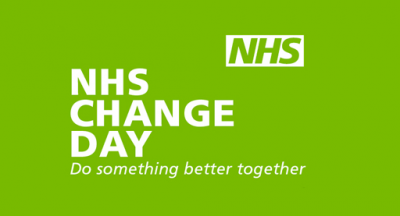The political parties will seek to highlight why their policies will best protect, fund and reform the service, all to the benefit of tax-paying patients, and will attempt to expose why their rivals’ efforts will weaken it.
But surely all politicians will support today’s NHS Change Day. Now in its third year, the initiative is a grassroots movement for change backed by the NHS, but instigated, developed and managed by frontline staff via social media.
It began with a single tweet two years ago and has since grown into a remarkable success story, with hundreds of thousands of individuals, teams and whole organisations across the NHS each pledging to do one thing differently to improve the service. Pledges have ranged from the simple (such as ensuring a child’s teddy bear is next to them when they wake up in recovery) to the innovative (such as helping terminally ill children understand the cycle of life, by growing and nurturing seeds on the ward). The only stipulation is that they must make a positive difference to patient care.
As we mark this increasingly important date in the NHS calendar, here are six reasons why NHS Change Day is helping revolutionise our health and social care system:
1. Existing success: Change Day has already struck a chord with NHS staff of all levels, who are realising what is possible by taking personal responsibility, especially when many have become disillusioned by the constant reforms made to the NHS from Westminster. Last year’s incredible number of pledges – around 500,000, surpassing the 189,000 made in 2013 – came from chief executives and managers, to nurses, doctors and healthcare assistants around the country.
2. An evolving movement: Whilst asking people to ‘pledge’ can have a significant impact, there can be instances where a pledge does not materialise into action. So this year the emphasis of Change Day is on taking action. This action can be anything, providing it is about doing something to improve care, attitudes, perspectives or the experience for patients or staff. Change Day evolves, in order to deliver genuine results.
3. The whole is bigger than the sum of its parts: The beauty of Change Day is these actions do not have to be big commitments. Some actions – smiling at a patient, or engaging with them in the waiting room – are on the face of it simple, but give a positive experience that patients remember. If everyone delivers on these actions, it will make a significant improvement.
4. An inclusive statement of intent: Change Day is about breaking down traditional barriers and recognising that everyone has the power to make a difference. For example, the chief executive of an NHS Trust used it as an opportunity to work alongside a porter last year, to understand the latter’s responsibilities and to connect over a positive message.
5. Opportunity for social care: With a greater public acknowledgement that there cannot be effective healthcare without good social care, this is a real opportunity to show how people’s experiences of these services can be improved, and to secure positive action around their integration.
6. Rome wasn’t built in a day: A major part of Change Day’s strength comes from the fact that those who get behind it do so because they want to, not because they feel they ought to. In time, their enthusiasm will become too infectious to ignore.
The excellent work NHS staff do on a daily basis is often overlooked as politicians argue over waiting times, missed targets, or funding black holes. NHS Change Day is an opportunity to provide some perspective, and most importantly, drive positive action through the grassroots, regardless of the political arguments in the run-up to 7th May.
*NHS Change Day is taking place today (11th March 2015). For more information visit www.changeday.nhs.uk




